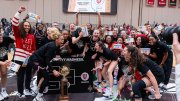Last Sunday, the Harvard women’s basketball team convened in the Murr Center’s Hall of History, surrounded by reminders of the University’s athletic tradition, including a photo from Harvard’s upset of top-seeded Stanford in the NCAA tournament nearly three decades ago. But the focus for this year’s squad was what lay ahead. Literally. Seated in rows in the center of the room, the team watched a television broadcast of the NCAA tournament selection show. When the announcers revealed that tenth-seeded Harvard (24-4 overall, 11-3 Ivy) would face seventh-seeded Michigan State, the room erupted in cheers. What will it take for the Crimson to upset the Spartans, and what would it mean for Harvard to make a run in March Madness?
After a third-place finish in the Ivy League regular season, the Crimson’s prospects for an NCAA tournament appearance were uncertain. To receive an at-large berth, Harvard likely needed to beat second-seeded Princeton in the Ivy Madness semifinals on March 14. The Tigers had swept both regular season games, in part by thwarting Harvard’s attempts to set ball screens for star guard Harmoni Turner ’25. At Ivy Madness, Delaney-Smith coach Carrie Moore had her team double their efforts, setting two screens for Turner in quick succession. “It’s really hard to guard a really good player twice in such a short span of space,” the coach explained. Turner, the 2025 Ivy League Player of the Year, scored a program-record 44 points in Harvard’s 70-67 win. Her performance invigorated the team, which went on to upset top-seeded Columbia 74-71 in Saturday’s championship game. The Crimson won the tournament and, with it, the league’s automatic bid to March Madness.
The coaches convened on Sunday to prepare. Moore had given the players that day and the next day off to savor their accomplishment. “They need to really feel this,” she said, “and be where their feet are right now and just enjoy it.” On Tuesday, the Crimson lifted weights and played limited pickup before shifting their focus to Michigan State at Wednesday’s practice. A Michigan native, Moore is familiar with the Spartans: she played basketball at Western Michigan in the mid 2000s, when Michigan State’s coach, Robyn Fralick, was a graduate assistant for the Broncos. Moore told her players that the Spartans use a full-court press on defense, like the Crimson. Harvard—which struggled with turnovers against Columbia’s press earlier this year—will need to handle the Spartans’ press and apply its own to disrupt Michigan State’s offense.
When the Spartans advance the ball, Harvard needs to be disciplined in half-court defense. A focal point will be Grace VanSlooten, a six-foot-three forward who leads Michigan State with 15.4 points and 3.3 offensive rebounds per game. Moore relies on a small but fast lineup that is adept at pressing, so the Crimson will have to keep themselves positioned in front of VanSlooten to make it hard for her teammates to pass the ball to her near the basket. On the outside, the Spartans have talented guards, including Julia Ayrault and Theryn Hallock, both of whom average at least 13.7 points per game. Harvard boasts the country’s sixth-best scoring defense, but Michigan State’s balanced attack is a formidable challenge.
Unlike Michigan State, the Crimson have just two players averaging over ten points a game: Turner and guard Elena Rodriguez ’25, a second-team all-Ivy honoree. Moore has emphasized other players must be aggressive. This makes it harder for defenses to key on Turner and Rodriguez. In the Ivy Madness championship game, the senior stars combined for 37 points, but guard Karlee White ’27 added 12 points on six-of-seven shooting. A role player scoring in double digits against the Spartans could be a bellwether for a Harvard upset.
This is Harvard’s seventh NCAA tournament appearance but its first since 2007, and it comes at a time when women’s basketball is having a moment. Last season, television ratings for WNBA games exploded, along with game attendance and merchandise sales. And in the college game, the 2024 NCAA women’s finals had more television viewers than the men’s, for the first time ever. (This year, there is more than one chance to watch Ivy League women play in the NCAA tournament: Columbia and Princeton received at-large berths, the first time the league has had three teams in.) The sport’s growing popularity has yielded lucrative name, image, and likeness deals for stars like Caitlin Clark, Angel Reese, and Cameron Brink.
Much of the groundwork for the game’s popularity, both at Harvard and across the country, was laid by former coach Kathy Delaney-Smith, who led the program to the NCAAs six times and retired in 2022 after 40 seasons. She was outspoken on gender issues (particularly equity) and taught her players to follow suit. Things have come a long way: In 1998, the year Harvard upset Stanford, only 47 of the 63 games in the women’s tournament were televised, and the Crimson’s star that season, Allison Feaster ’98, had been planning to take a job at a Wall Street bank, until she was selected in the WNBA draft. (She is now a front office executive with the Boston Celtics.)
This year, in Harmoni Turner, the national AP Player of the Week, the Crimson have an electric player who excites fans and could lead Harvard on a tournament run. If that happens, she and her teammates may not only see their photos in the Murr Center’s Hall of History but also leave a broader imprint.
The Crimson and Spartans tipoff on Saturday in Raleigh, North Carolina at 4:30 pm ET on ESPNews.









